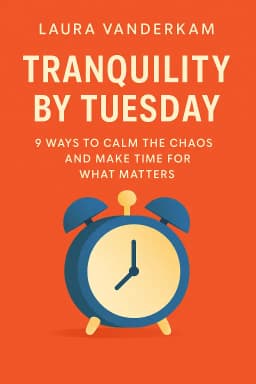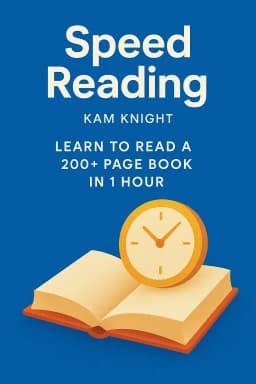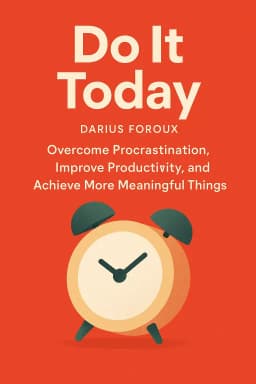
The To-Do List Lie
The Productivity Habits of 7 Billionaires, 13 Olympic Athletes, 29 Straight-A Students, and 239 Entrepreneurs
Golden Hook & Introduction
SECTION
Mark: A study found 41% of all to-do list items are never completed. That means for every ten things you write down, four are just wishes you'll never grant. What if the most common productivity tool is actually a failure machine? Michelle: Hold on, 41 percent? That feels personally attacking. My entire life is a series of nested to-do lists. If they're not working, then what I'm doing is just... organized chaos. Mark: Organized chaos is the perfect term for it. And that's the core question behind a book that really flips the script on productivity. Today we’re diving into 15 Secrets Successful People Know About Time Management by Kevin Kruse. Michelle: And this isn't the famous historian Kevin Kruse, right? This is the entrepreneur and leadership guy. Mark: Exactly. And he backs his ideas with research on billionaires, Olympic athletes, and hundreds of entrepreneurs. The book became a New York Times bestseller precisely because it argues that most of what we think about time management is wrong. Michelle: Okay, a bestseller based on telling people their favorite tool is broken. I'm intrigued. Where does he even start? Mark: He starts with a bombshell. The book's first big idea is that the very phrase 'time management' is a trap. He argues that highly successful people don't manage time at all.
The 'Time Management' Myth: It's Not About Time, It's About Energy and Mindset
SECTION
Michelle: Wait, they don't manage time? What else is there? That's like saying a chef doesn't manage food. Mark: It sounds crazy, but he makes a powerful case that the real resource we should be managing is our energy. Time is fixed. We all get 1,440 minutes a day. You can't make more. But you can dramatically increase your energy and focus within those minutes. Michelle: Huh. But I feel like I have no energy because I have no time. The two feel completely tangled. How do you separate them? Mark: He uses his own life as a cautionary tale. He describes this period where he was a "crazy busy" executive, working 12-hour days, wolfing down food at his desk, completely neglecting his health and family. He was the master of to-do lists and efficiency hacks, but he was miserable and making dangerous mistakes. Michelle: What kind of mistakes? Mark: The kind that get you pulled over by a state trooper. He tells this story about driving to work at 5:20 in the morning, completely exhausted. He's doing over 80 mph and blows past a cop. When the officer pulls him over and asks what the hurry is, Kruse just blankly admits, "Officer, I'm so sorry, I was completely zoned out. I haven't been sleeping." Michelle: Wow. That's a wake-up call, literally. Mark: And it gets worse. Around the same time, he was so distracted at a gas station that he filled up his tank, got back in the car, and just drove off... with the nozzle still in the car. He ripped the entire hose right off the pump. Michelle: Oh my god. That’s not just busy, that’s a public menace! Mark: Exactly! And that was his lightbulb moment. His problem wasn't a lack of time management skills. He was a master of that. His problem was a total and complete lack of energy. He was running on empty, and it was making him stupid and reckless. Michelle: Okay, I can see that. When I'm exhausted, I'll stare at a simple email for twenty minutes. When I'm energized, I can clear my inbox in ten. So it's not about finding more hours, it's about making the hours you have higher quality? Mark: That's the entire premise. The book introduces this idea of the "1440." There are 1,440 minutes in a day. That's it. For everyone. For you, for me, for Richard Branson. And the goal isn't to cram more into them, but to invest them with intention. At his company, Kruse put a giant "1440" sign on his office door. Michelle: The '1440' sign on the door feels a little aggressive, no? Like a doomsday clock for your workday. Mark: It is aggressive! But he says it forced a crucial question every time someone came to his door with a "got a minute?" request. It made both him and them think, "Is this the best use of one of these precious 1440 minutes?" It’s about cultivating a mindset of intentionality, not just efficiency. Michelle: I see. It’s a filter. It’s not about the number itself, but about making you pause and value the resource. That makes sense. Okay, so if I'm focusing on energy and being intentional with my 1440 minutes... what do I do with my beloved to-do lists? Mark: You burn them. Metaphorically, of course. Michelle: Metaphorically? I'm not so sure. If they're 'failure machines,' maybe a ceremonial bonfire is in order.
The Calendar Cult: Why To-Do Lists Are Sabotaging Your Success
SECTION
Mark: A bonfire might be appropriate! The book's second major argument is that to-do lists are one of the biggest sources of stress and failed productivity. That 41% statistic is just the start. Michelle: Okay, but why? They feel so productive. I write something down, I cross it off. I get a little dopamine hit. It feels like progress. Mark: It feels like progress, but Kruse argues it's an illusion. The problem is that a to-do list has no sense of time or commitment. "Write report" and "buy milk" can sit next to each other, but one takes three hours and the other takes ten minutes. So what do we do? We do the easy, urgent things—like buying milk—to get that dopamine hit, while the important, non-urgent things get pushed to tomorrow, and then the next day, forever. Michelle: Guilty. My "learn Spanish" task has been on my to-do list since 2015. Mark: And there's a psychological cost to that. The book brings up something called the Zeigarnik effect. It's a principle from psychology that says our brains are wired to obsess over unfinished tasks. That long list of things you haven't done creates a constant, low-grade hum of anxiety in the back of your mind. Your to-do list is literally stressing you out. Michelle: Okay, the Zeigarnik effect explains so much about my 3 a.m. "oh-I-forgot-to-email-so-and-so" panic sessions. So if to-do lists are out, what's the alternative? A blank piece of paper and good vibes? Mark: The alternative is your calendar. And not just for meetings. For everything. The ultra-successful people Kruse interviewed don't have to-do lists; they have highly scheduled calendars. If it's important, it gets a time slot. Michelle: Everything? Like, "eat lunch" is on the calendar? "Walk the dog"? That sounds incredibly rigid. Mark: It sounds rigid, but the book argues it's the opposite—it's freeing. When you schedule a task, you're making a real commitment. You've done the hard work of deciding when and for how long. It frees your brain from having to constantly juggle priorities. Jordan Harbinger, the podcast host, schedules his day in 15-minute blocks. Workouts, email blocks, calls—everything. Michelle: Fifteen-minute blocks? That sounds exhausting and completely inflexible. What happens if a call goes long or my kid gets sick? Life isn't that predictable. Mark: And that's the key distinction. The goal isn't to be a robot. The rule is you can reschedule anything, but you can't just cancel or ignore it. If your Most Important Task for Tuesday morning gets derailed, you don't just forget about it. You immediately move that block to another time on your calendar. It forces you to confront the trade-offs. Michelle: So the calendar isn't a jail cell, it's more like a GPS. It gives you the ideal route, but you can always reroute if there's traffic. Mark: That's a perfect analogy. And it's not just for cramming more work in. Jeff Weiner, the CEO of LinkedIn, famously schedules 90 minutes of "do nothing" time into his calendar every single day. It's buffer time for thinking, for processing, for just being. Because if he didn't schedule it, it would never happen. Michelle: Scheduling 'do nothing' time. That's a level of productivity enlightenment I have not yet reached. But it makes sense. If you don't defend that time, the world will fill it for you. Mark: And that GPS is crucial, because even with a perfect schedule, we have an internal enemy trying to sabotage the journey: our future self.
The Procrastination Paradox: Battling Your 'Future Self'
SECTION
Michelle: Our future self is the enemy? That sounds like the plot of a sci-fi movie. I thought my future self was supposed to be this amazing, productive person who has it all figured out. Mark: That's what we all hope! But the book argues that procrastination isn't about laziness. It's a battle between your present self, who wants the immediate gratification of watching another cat video, and your future self, who wants the long-term reward of a completed project. And usually, the present self wins. Michelle: Tell me about it. My present self is a master negotiator when it comes to justifying "just five more minutes" of scrolling. Mark: Kruse shares this hilarious and brilliant story about a friend of his who was trying to eat healthier. She'd go to a restaurant, order a healthy meal, but it would come with a side of French fries. She knew her "future self"—the self that would exist five minutes into the meal—would have zero willpower and eat them all. Michelle: A classic dilemma. What did she do? Mark: As soon as the plate hit the table, she would grab the salt shaker and dump the entire thing all over the fries. Just completely ruin them. Michelle: (Laughs) That is brilliant and slightly unhinged. I love it. Mark: Isn't it? She was proactively defeating her future, weaker self. She created an immediate and irreversible consequence. And that's the core strategy the book proposes for beating procrastination: you have to anticipate how your future self will try to sabotage you and set up systems to prevent it. Michelle: So the idea is to create consequences or barriers for your future lazy self? It's like a pre-emptive strike against your own worst instincts. Mark: Exactly. It's what economists call "time inconsistency"—we value a small reward now much more than a big reward later. So you have to trick your present self. The book offers a bunch of "procrastination busters." You can get an accountability partner, where you have to pay them money if you don't finish a task. Or you can use the "act as if" technique—if you want to be a writer, you tell people "I am a writer" and start acting like one, which creates a new identity to live up to. Michelle: I like that. You're essentially making it more painful to procrastinate than to do the actual work. You're changing the emotional math of the decision. Mark: You're changing the math. You're acknowledging that willpower is a finite resource and you can't rely on it. Instead, you design a system that makes doing the right thing the path of least resistance.
Synthesis & Takeaways
SECTION
Michelle: So, when you put it all together, it seems the book's message isn't about becoming a productivity robot who schedules every breath. It's about being brutally honest about your energy, making firm commitments on a calendar, and then having the self-awareness to protect yourself from... well, yourself. Mark: Exactly. It’s about designing a system that makes your desired outcomes almost inevitable. It’s less about managing the 1,440 minutes and more about managing the energy, decisions, and psychology you bring to them. The time just becomes the container. Michelle: It feels more holistic. It connects your physical state—your energy—to your intentions, which you commit to on the calendar, and then acknowledges the psychological battle you'll face with procrastination. Mark: And it’s all grounded in what these incredibly successful people actually do, not just what theory says they should do. They've all figured out their own version of this system. Michelle: So maybe the one thing to try this week isn't a new app or a complicated new system. Maybe it’s just one small experiment. Mark: I think that's the perfect takeaway. Don't try to overhaul your whole life tomorrow. Just try one thing. Maybe it's scheduling your Most Important Task—your MIT—into your calendar for tomorrow morning. Just one thing. And treat it like a doctor's appointment you absolutely cannot miss. See how that feels. Michelle: I'd also love to hear if anyone tries the salt-on-the-fries trick. Or maybe a less extreme version! Let us know what your biggest procrastination enemy is and how you fight it. It’s a battle we’re all in. Mark: This is Aibrary, signing off.









